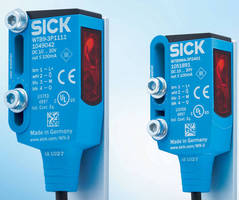Jan 31 2011
Minneapolis-based SICK, a producer of sensors, safety systems, machine vision, and auto-identification devices for use in factories and logistics automation, has unveiled its W9-3 photoelectric sensor.
The device is a high-performance sensor encased in tough plastic. It has a range of options, like sensing range, mounting, and connectivity, and is suitable for multi-applications such as identifying clear material, differently hued and glittering objects in the material handling and food and beverage industries.

The W9-3 is fabricated in plastic and its molding process makes it really tough. The material VISTAL(TM) is nine times tougher than normal ABS. The connector is over-molded so that the sensor developed in this fashion is almost unbreakable. The device deploys ASIC (application-specific integrated circuit) that includes OES3 technology. This gives extra advantages like high background suppression over an expanded range. The OES3 includes ownership technology that allows the device to ignore unnecessary background images, identify differently colored and glittering objects, with high resistance to ambient light.
The device offers numerous mounting options because its design has slotted holes. This feature allows the device to be mounted from 5.2 to 13.7mm and 18.9 to 27.4mm allowing it to be mounted in multi-configurations.
It is available with complementary light and dark operate outputs in a single housing reducing component count. It offers teach-in or potentiometer adjustment. It is taut, not allowing movement of components and a push button facility.
Source: http://www.sickusa.com